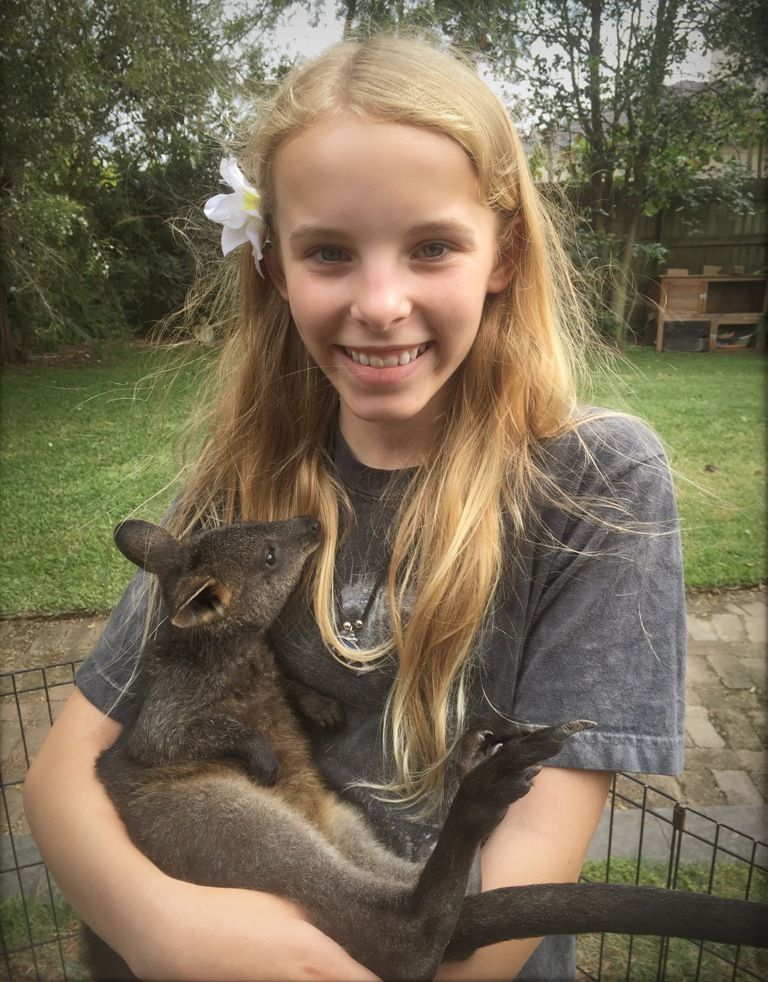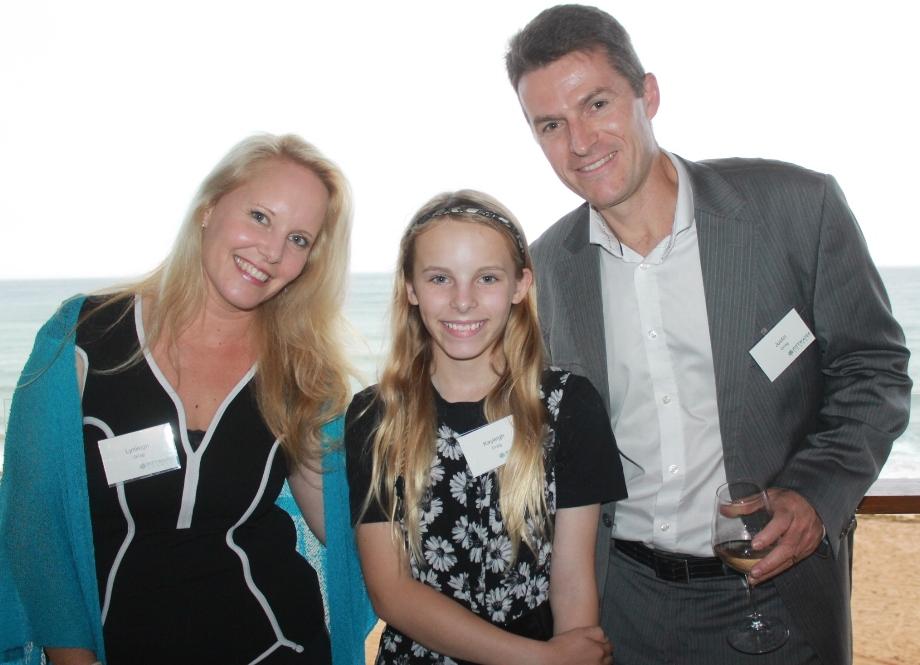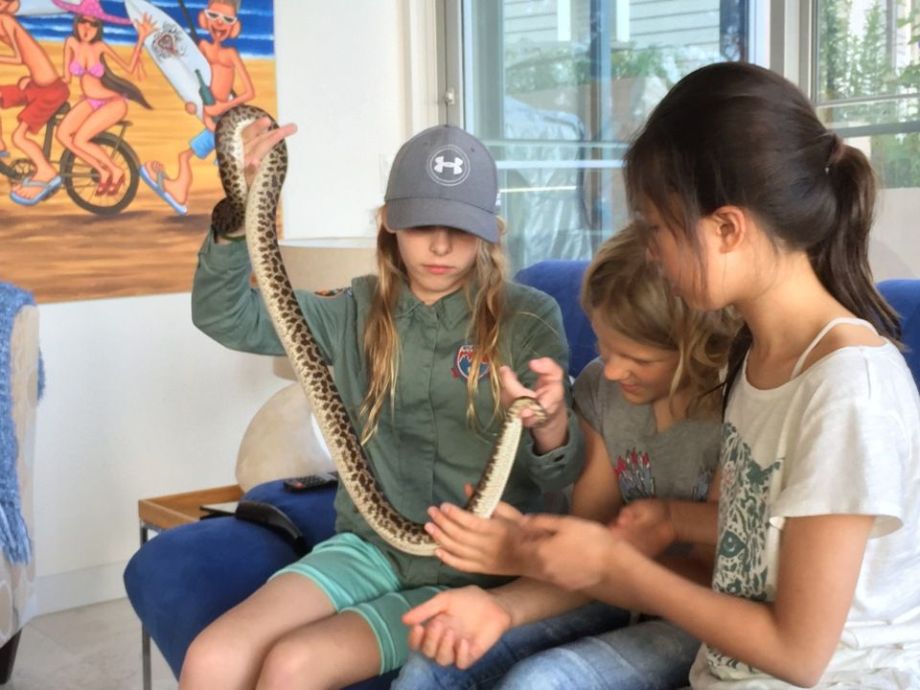January 24 - 30, 2016: Issue 248
When One’s Alarm Clock Says Hiss, Not Beep, You’re At Kayleigh’s House!

Kayleigh with a swamp wallaby joey
When One’s Alarm Clock Says Hiss, Not Beep, You’re At Kayleigh’s House!
Wake up, get ready for school, oh and don’t forget to say goodbye to the bearded dragons, baby possums, blue tongue lizards, multiple snakes, turtles and other various, recuperating Australian animals that are currently in our care!
At least, that’s the usual routine for my brother, Connor (14) and I Kayleigh (12) and we love it!
Having a mother who works as a volunteer for Sydney Wildlife, Southern Cross Wildlife Care, the Wildlife Roadkill Prevention Association and numerous other animal welfare groups, certainly has its perks! Due to my Mom’s constant involvement in wildlife rescue, rehabilitation and release, the Greig family household is a sanctuary for the hindered animalia of Australia.
My awesome dad may not be the biggest fan of animals but we are grateful for his tolerance (and we are even more amused by his startled reactions whenever we hide a snake in his birthday presents…)!
Throughout our experiences, we have saved an assortment of different creatures from myriad bizarre places. From animals trapped in the electrical room of a water treatment facility (hundreds of metres underground on a level aptly named ‘the Bat Cave’ or ‘Hell’) to the rooftops of two-storey houses and even echidnas in the dashboard of a car.
Most critters get into trouble by accident, but the saddest occurrences are when we humans do terrible things to the animals. Animal cruelty is illegal. Even chopping a snake with the dreaded ‘garden shovel’ is no innocent act, and it can cost you a hefty fine. Also, under no circumstances is suctioning a baby red-bellied-black snake into a vacuum cleaner a good idea (because that has actually happened before!)
In most cases, you should call an organisation such as Sydney Wildlife or Wires for advice before doing anything for wildlife in distress. Also, if you are told to keep baby animals warm, DO NOT PUT THEM IN THE OVEN to keep them warm while you wait for the professionals to arrive, or the birds will not survive (again – something that has actually happened)!!!
Bringing friends to my house really singles out the braver ones from the others, what with the menagerie of snakes around…
We have future plans of being partners in crime… I MEAN um, animal care of course… Is it hot in here or is it just me? Heh heh…
I cannot wait until I am old enough to become an animal carer myself, but in the meantime, I certainly encourage anyone who is eighteen or older to join this wonderful ‘job’. There is never a dull moment!
By Kayleigh Greig (12 years old)
Pittwater's Australia Day Award 2016: Young Citizen of the Year Kayleigh Greig
On Thursday 21 January Pittwater Council announced its Pittwater Citizen of the Year, Young Citizen of the Year and Sportsperson of the year at a reception held at Avalon Beach Surf Life Saving Club.
Pittwater’s Young Citizen of the Year is Kayleigh Greig. Kayleigh is only 12 years of age and is already an active wildlife ambassador.

Lynleigh, Kayleigh and Justin Grieg at Pittwater Council's Australia Day Awards 2016
We spoke to Kayleigh on Friday about helping her mum Lynleigh look after our native animals as a volunteer carer for Sydney Wildlife, Southern Cross Wildlife Care and Wildlife Roadkill Prevention Association and about winning this year's Young Citizen Australia Day Award for Pittwater;
When and why did you begin doing this?
I began my involvement in all things wild when I surprised my parents with a request for a serpentine pet on my seventh Birthday...
Soon after we obtained the most wonderful pet ever (Scayleigh Slithers Greig - a beautiful Spotted python), people started ringing us for advice about wild snakes that were in their yard/house/garage. We always went to help out, and eventually my mom decided to learn the correct handling techniques and became a volunteer rescuer for Sydney Wildlife.

Kayleigh with Scayleigh and her mates
What was the first animal you looked after and what did this involve?
The first animal we looked after when mum joined Sydney Wildlife was a superb fairy wren who was rescued from a sticky insect mat by a worker at a plant nursery. Sadly, as a result of being stuck to the insect mat, many of the little wren's feathers were ripped out during the process. Appropriately, we named her Plucky.
Listening to her cheerful tweeting and excited fluttering on her road to recovery, we could all see that this was a beginning to a long line of furry, scaly and feathery faces, just waiting to be rescued!
Being awarded the Young Citizen of the Year 2016: how does this feel?
Being Pittwater's Young Australian Citizen of the Year has provided me with many reasons to be ecstatic! For one, it was very flattering and I think I was smiling so hard I might have looked creepy... But it was also a huge triumph for Australian native wildlife, as it showed that the protection of animals (not just pets) is being recognised. We must hope that many others also use their passions for wildlife to lend a hand.
What’s next?
My next aim is to get funding to create a ‘Mobile Wildlife Hospital’- the first of its kind - to use in roadkill hotspots. With all the road widenings and the new hospital site, wildlife are going to be harmed on the busy roads. We have already pleaded for help from some of our politicians and are optimistically waiting for their response…
Kayleigh, we'll place this among our Pittwater Profiles, these are where we get to celebrate and honour the wonderful people here, and check in with you soon for more - for the moment though, as a final note, do you have a 'motto'?
Standing up for yourself is great, but standing up for others is greater...
____________________________
Sydney Wildlife operates in the Greater Sydney Metropolitan Area which extends from the Hawkesbury River in the north, to Picton in the south and from the foothills of the Blue Mountains to the ocean. Phone: 9413 4300.
As well as caring for sick, injured and orphaned native wildlife, Sydney Wildlife is also involved in educating the community about native wildlife and its habitat. From kindergartens to retirement villages, community education packages are tailored to meet the specific needs of a wide range of audiences.
Sydney Wildlife is an entirely voluntary, charitable organisation. There are no paid staff what-so-ever.
Sydney Wildlife is licensed to do the work it does by the National Parks and Wildlife Service under the National Parks and Wildlife Act, 1974. Sydney Metropolitan Wildlife Service Inc.'s registration number is: Y256271-5
People over 18 may Train to become a wildlife rescuer and carer
Next course - 20-21st February 2016 at Northbridge
If you would like to become a Wildlife Rescuer, a Wildlife Carer or help out answering Sydney Wildlife's Rescue Hotline; if you are at least 18 years old and live in the Greater Sydney Metropolitan area, then you might like to join the team at Sydney Wildlife by completing a two day Rescue and Care Course.
You don't need any special qualifications to do the course, just a love of animals and a commitment to the protection of native wildlife and habitat.
The two day course covers the rescue and care of a variety of native animals including adult possums, lizards, turtles and a wide range of birds. After completing the course and gaining some experience you can choose to go on to do other courses and learn how to rescue and care for other animals such as baby possums, macropods (such as kangaroos and wallabies), raptors (such as owls, falcons and other birds of prey), snakes and bats.
The cost is $100 per person (or $130 for two people sharing materials who reside at the same address). The fee covers the cost of a range of materials; start-up equipment and a license fee of $30.00 per person.
For more information on what's Involved (in Becoming a Carer)
Southern Cross Wildlife Care was founded by Pittwater veterinarian and long standing wildlife care specialist, Dr. Howard Ralph. Southern Cross Wildlife Care was established for the sole purpose of treating and caring for injured, sick and orphaned wildlife.
Dr Ralph does all this work at no cost and SCWC relies on volunteer carers and donations to meet the expenses for medical equipment, medicines, power, maintenance, oxygen, food, cages and many other associated items needed for this vital service.
There is a Care Centre is in the Southern Tablelands and Dr. Ralph also treats sick and injured wildlife in Sydney. Howard travels every fortnight to the Southern Tablelands to attend to the growing number of animals that are injured or too sick to travel.
Southern Cross Wildlife Care is treating and saving thousands of our native animals every year. SCWC could also use your support with other types if volunteering such as data entry, PR/Advertising, promotion and fund raising.
The Wildlife Roadkill Prevention Association aims to reduce death and injury to native animals, especially swamp wallabies, on the Northern Beaches of Sydney, Australia, including the major arterial roads: The Wakehurst Parkway, Mona Vale Road and McCarrs Creek Road.
The association was formed in 2005 to address wildlife roadkill and raise awareness of broader conservation issues on Sydney's Northern Beaches. The group is a broad alliance between local government, police, the Roads and Maritime Services (RMS), National Parks and Wildlife Service, scientific advisers, WIRES and Sydney Wildlife.
In 2005, committee members began collecting data on the location, species and date of each wildlife fatality on key arterial roads. As a result, the RMS and Warringah Council funded a 0.5 km swamp wallaby exclusion fence on the Wakehurst Parkway, a main arterial road of the Northern Beaches.
The fence has been an outstanding success, as no swamp wallabies have been killed or injured on the protected section of road since it was put up.
The association is now actively involved in lobbying the RMS to incorporate roadkill mitigation devices in roadworks planned near the new Northern Beaches Hospital in Frenchs Forest.
How to help an injured animal: Roads
STOP carefully if it is safe for you and other vehicles.
WRAP THE ANIMAL in a towel or pillowcase and place in a secure box.
CALL WILDLIFE RESCUE or go to the nearest vet.
Keep the animal warm, quiet and in the dark DO NOT FEED or offer water. Keep noise to a minimum.
AVOID HANDLING the animal to keep it calm. Keep it away from domestic pets and children.
Place it in a SECURE AND STABLE part of the vehicle - on the seat or the floor
Please CHECK POUCHES: they may contain young.

Above and Below: Kayleigh receiving her Australia Day 2016 Young Citizen of the Year Award from our clearly happy Mayor of Pittwater, Cr. Jacqueline Townsend.
